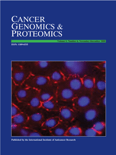
Cancer Genomics & Proteomics
Scope & Guideline
Innovating diagnostics and therapeutics with cutting-edge research.
Introduction
Aims and Scopes
- Genomic Characterization of Cancers:
The journal publishes studies that focus on the genetic alterations in various cancers, including large-scale genomic analyses that identify mutations, copy number variations, and other genomic features that drive cancer progression. - Proteomic Profiling and Biomarker Discovery:
Research highlighting the role of proteomics in understanding cancer biology and identifying potential biomarkers for diagnosis and prognosis is a core focus area, with studies employing advanced proteomic techniques. - Therapeutic Strategies and Drug Resistance:
Papers examining novel therapeutic approaches, mechanisms of drug resistance, and the development of targeted therapies based on genomic and proteomic insights are emphasized. - Cancer Microenvironment and Immunology:
The journal explores the interactions between cancer cells and their microenvironment, including studies on immune responses, tumor-stroma interactions, and the implications for therapy. - Translational Research and Clinical Implications:
Research that bridges laboratory findings with clinical applications, including studies that assess the clinical utility of genomic and proteomic findings in patient management, is a significant aspect of the journal.
Trending and Emerging
- Novel Therapeutic Targets and Strategies:
Recent publications are increasingly focusing on identifying new therapeutic targets based on genomic and proteomic data, particularly in the context of personalized medicine and targeted therapies. - Role of Non-coding RNAs in Cancer:
There is a rising trend in research exploring the role of non-coding RNAs, including circular RNAs and long non-coding RNAs, in cancer biology, which are being recognized for their potential as biomarkers and therapeutic targets. - Cancer Metabolism and Microenvironment:
Studies examining the metabolic adaptations of cancer cells and the influence of the tumor microenvironment on cancer progression and therapy response are gaining prominence, reflecting a broader interest in the metabolic aspects of cancer. - Immunotherapy and Immune Profiling:
Emerging research focusing on the immune landscape of tumors, including the role of immune checkpoints and the tumor microenvironment in modulating immune responses, is increasingly prevalent. - Integration of Multi-Omics Approaches:
There is a growing interest in studies that integrate genomic, proteomic, and metabolomic data to provide a comprehensive understanding of cancer biology and to identify novel biomarkers and therapeutic strategies.
Declining or Waning
- Basic Science Studies Without Clinical Relevance:
There has been a noticeable decrease in publications that focus solely on basic cancer biology without clear translational or clinical implications, as the journal increasingly emphasizes studies that directly inform patient care. - Single-Modality Studies:
Research focusing exclusively on either genomic or proteomic analysis, without integration, appears to be declining. The trend is moving towards more comprehensive studies that combine both modalities for a more holistic understanding of cancer. - Older Therapeutic Approaches:
Papers centered on traditional therapeutic approaches, such as chemotherapy without genomic context, are less frequent. The journal seems to be favoring innovative and targeted therapeutic strategies backed by molecular data.
Similar Journals
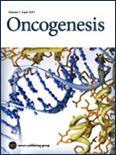
Oncogenesis
Fostering global collaboration in cancer discovery.Oncogenesis is a prestigious open access journal, published by SpringerNature, dedicated to advancing our understanding of cancer biology and molecular mechanisms of oncogenesis. Since its inception in 2012, this journal has quickly established itself as a leading platform for innovative research, being ranked in the Q1 quartile in both Cancer Research and Molecular Biology categories for 2023. With an admirable impact factor that reflects its exceptional quality, Oncogenesis is indexed in Scopus, holding notable rankings in both Molecular Biology and Cancer Research, placing in the 87th and 83rd percentile respectively. The journal not only facilitates the dissemination of groundbreaking research but also encourages collaboration among scientists and healthcare professionals across the globe. By offering open access to its articles, Oncogenesis ensures that vital findings reach a diverse audience, fostering a deeper dialogue and understanding in the fight against cancer. Based in the United States but with a global reach, the journal remains committed to publishing high-impact studies that contribute to the advancement of knowledge in the realms of oncology, biochemistry, and genetics.
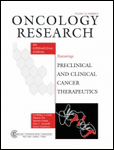
ONCOLOGY RESEARCH
Elevating Knowledge in the Fight Against CancerONCOLOGY RESEARCH, published by TECH SCIENCE PRESS, is a vital academic journal dedicated to the rapidly evolving field of oncology. With its ISSN 0965-0407 and E-ISSN 1555-3906, the journal serves as a key resource for researchers, clinicians, and academicians committed to advancing cancer research and treatment strategies. Operating without an Open Access model, ONCOLOGY RESEARCH provides high-quality, peer-reviewed articles that cover diverse topics within cancer research, medicine, and oncology, with its 2023 Scopus ranking placing it in the Q3 quartile. The journal's commitment to facilitating rigorous scientific discourse is evident in its historical breadth, with a publishing history dating back to 1992. ONCOLOGY RESEARCH is not only significant for the academic community but also plays a critical role in fostering new insights and approaches in the fight against cancer, making it a must-read for those involved in this critical area of study.

MOLECULAR CARCINOGENESIS
Innovative Discoveries in Molecular OncologyMOLECULAR CARCINOGENESIS is a prestigious academic journal published by Wiley, dedicated to advancing the understanding of the molecular basis of cancer. Established in 1988, this journal serves as a vital resource for researchers and professionals in the fields of cancer research and molecular biology. With an impressive impact factor reflecting its significance in the Q2 category for both Cancer Research and Molecular Biology, it stands out for its high-quality, peer-reviewed articles that explore innovative research, novel findings, and emerging trends in carcinogenesis. Although the journal currently does not offer open access options, it remains accessible to the academic community through numerous institutional subscriptions. Positioned in the United States and contributing to the global discourse on cancer research, MOLECULAR CARCINOGENESIS is an essential publication for anyone engaged in the study of cancer at the molecular level.
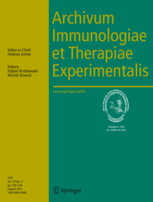
ARCHIVUM IMMUNOLOGIAE ET THERAPIAE EXPERIMENTALIS
Exploring Innovations in Immunological ResearchARCHIVUM IMMUNOLOGIAE ET THERAPIAE EXPERIMENTALIS, published by DE GRUYTER POLAND SP Z O O, stands as a pivotal journal in the field of immunology, contributing significantly to the advancement of knowledge and therapy in this crucial area of medicine since its inception in 1954. With an ISSN of 0004-069X and an E-ISSN of 1661-4917, the journal operates out of Switzerland, catering to an international audience of researchers, practitioners, and students. As reflected in its Scopus rankings, the journal is positioned within the third quartile in both Immunology and Allergy (Q3) and holds a commendable second quartile in Medicine (miscellaneous) (Q2), indicating its respectable influence within the academic community. The journal publishes original research, reviews, and clinical studies, offering a platform for exploring cutting-edge developments in immunological therapies and experimental methods. Although not currently an open-access journal, it continues to thrive as a valuable resource, reflecting a commitment to disseminating high-quality research and fostering academic discourse in the field. Researchers and professionals alike will find ARCHIVUM IMMUNOLOGIAE ET THERAPIAE EXPERIMENTALIS an essential reference source for the latest advancements in immunological research and clinical applications.
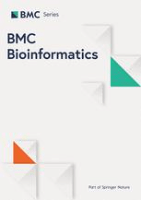
BMC BIOINFORMATICS
Unleashing the Power of Data in Life Sciences.BMC Bioinformatics is a leading open-access journal published by BMC, dedicated to the rapidly evolving field of bioinformatics. With its inception in 2000, the journal has established itself as an essential resource for researchers, professionals, and students alike, disseminating high-quality research that bridges the gap between biology and computational science. BMC Bioinformatics holds a reputable Q1 ranking in Applied Mathematics and Computer Science Applications, and a Q2 ranking in both Biochemistry and Structural Biology, reflecting its significant impact in these interdisciplinary fields. The journal's broad scope encompasses innovative methodologies, tools, and applications that drive progress in biological research through computational approaches. With open access since its inception, the journal ensures unrestricted availability of cutting-edge research findings, promoting knowledge sharing and collaboration in the global scientific community. As it continues to publish advancements up to 2024, BMC Bioinformatics remains a cornerstone for those seeking to enhance their understanding of bioinformatics and its vital role in modern science.
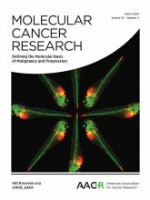
MOLECULAR CANCER RESEARCH
Transforming Research into Revolutionary TreatmentsMOLECULAR CANCER RESEARCH, published by the American Association for Cancer Research, stands as a pivotal journal in the fields of cancer research, molecular biology, and oncology. With an impressive impact factor and recognized as a Q1 journal in its respective categories for 2023, it serves as an essential resource for researchers, professionals, and students aimed at advancing our understanding of cancer mechanisms and therapies. The journal, identified by the ISSN 1541-7786 and E-ISSN 1557-3125, provides a platform for cutting-edge research and clinical applications, emphasizing innovation and collaboration within the scientific community. With its focus on high-quality, peer-reviewed articles, MOLECULAR CANCER RESEARCH is vital for anyone looking to stay abreast of significant advancements in cancer biology and treatment strategies. For more details and to access the journal's content, please visit the publisher's link.

Annual Review of Cancer Biology
Unraveling Innovations in OncologyAnnual Review of Cancer Biology is a pivotal journal published by Annual Reviews, specializing in the rapidly evolving field of cancer research. With an impact factor positioned in the distinguished Q1 quartile of Cancer Research, Cell Biology, and Oncology categories, this journal ensures that it showcases the highest quality of scholarly contributions. Indexed in Scopus, it ranks among the top in its fields, reflecting its strong influence and relevance, with remarkable percentiles indicating its esteemed position within the research community. Although not an open-access journal, it provides a comprehensive platform for advancing the frontiers of cancer biology through rigorously curated reviews, highlighting key developments, breakthroughs, and future directions that inform both academia and clinical applications. As a valuable resource for researchers, professionals, and students, the Annual Review of Cancer Biology serves as an essential guide for understanding and addressing the complexities of cancer biology today.

PATHOLOGY RESEARCH AND PRACTICE
Exploring the Depths of Pathology and Forensic MedicinePATHOLOGY RESEARCH AND PRACTICE is a premier journal in the field of pathology and forensic medicine, published by Elsevier GmbH in Germany. With a rich publication history since 1978 and an impressive convergence period extending to 2024, this journal serves as a vital resource for researchers and professionals dedicated to advancing the understanding of pathological processes. It holds notable rankings, including Q3 in Cell Biology and Q2 in Pathology and Forensic Medicine for 2023, reflecting its significance in the academic community. The journal aims to publish innovative research findings, reviews, and case studies, facilitating a deeper understanding of disease mechanisms and improving diagnostic practices. Authors and readers alike benefit from its reputable platform, noted for its challenging and rigorous peer-review process. By fostering a collaborative environment and providing open access options, PATHOLOGY RESEARCH AND PRACTICE continues to contribute meaningfully to the discourse within its respective fields, thereby appealing to a diverse audience of researchers, professionals, and students.
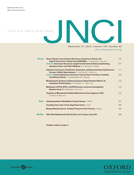
JNCI-Journal of the National Cancer Institute
Empowering oncologists with groundbreaking insights.JNCI-Journal of the National Cancer Institute, published by Oxford University Press Inc. in the United Kingdom, is a premier journal dedicated to advancing the field of cancer research and oncology. With a distinguished history dating back to 1940, this journal has consistently maintained a strong reputation within the academic community, achieving a remarkable Q1 ranking in both Cancer Research and Oncology as of 2023. Researchers and practitioners rely on the JNCI for original research articles, review papers, and cutting-edge findings that impact clinical practices and therapeutic strategies. Although it does not currently offer open access, the journal remains a vital resource for academicians and healthcare professionals seeking to enhance their understanding of cancer mechanisms and treatment innovations. Its rigorous peer-review process ensures the publication of high-quality, credible research that meets the evolving challenges of cancer treatment and prevention through to 2024.

CANCER AND METASTASIS REVIEWS
Illuminating Pathways in Oncology and MetastasisCancer and Metastasis Reviews, published by Springer, is a leading journal in the field of oncology and cancer research. With an impressive impact factor placing it in the Q1 category for both Cancer Research and Oncology as of 2023, this journal is ranked 29th out of 404 in Medicine, Oncology, and 22nd out of 230 in Biochemistry, Genetics, and Molecular Biology, reflecting its significant influence and prestige in the academic community. Established in 1982, the journal covers a wide spectrum of topics related to the mechanisms of cancer progression and metastasis, making it an essential resource for researchers, healthcare professionals, and students dedicated to understanding and tackling cancer. Although the journal does not provide open access options, the impactful research it publishes contributes to advances in therapeutic strategies and enhances the collective knowledge surrounding cancer pathophysiology. With research converging from 1982 to 2024, Cancer and Metastasis Reviews continues to be a vital platform for disseminating high-quality scientific information in the ever-evolving landscape of cancer research.